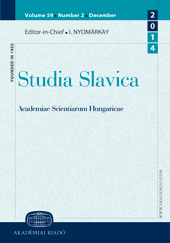Ambiguität (nicht nur) als ästhetische Selbstbehauptung: russische Literatur im 20. Jahrhundert im Fokus der Bachtinschen Dialogizität
Ambiguity (not only) as aesthetic self-assertion: Russian literature in the 20th century in the focus of Bachtin's Dialogicity
Author(s): Andrea Meyer-FraatzSubject(s): Russian Literature, Eastern Slavic Languages, Theory of Literature
Published by: Akadémiai Kiadó
Keywords: ambiguity; ambivalence; Bakhtin; dialogism; (post)modernism;
Summary/Abstract: Mikhail Bakhtin’s term of “dialogism” is closely connected with the terms of “ambiguity” and “ambivalence”. Describing dialogism, hybridity, and polyphony in his study “Слово в романе” [The word in the novel] he creates a poetics of ambiguity and ambivalence. The current study demonstrates on the examples of four Russian writers of the 20th century how Bakhtin’s theory can be understood this way, forming a parallel with the poetics of contemporary writers such as Daniil Kharms, Yevgeny Zamyatin, and Andrei Platonov as well as writers of the second half of the century such as Andrei Bitov. Whereas in the case of Kharms, the inherent ambiguity of the text dealt with in this article leads to a sort of dialogue among scholars, the cases of Zamyatin and Platonov are closely linked with the problem of dystopia, for which is typical the penetration of dialogism into a monological world. The last case, Andrei Bitov’s novel “Puskinhouse”, is closely linked with postmodernist ambiguity.
Journal: Studia Slavica Academiae Scientiarum Hungaricae
- Issue Year: 59/2014
- Issue No: 2
- Page Range: 405-416
- Page Count: 12
- Language: German
- Content File-PDF

